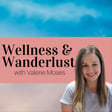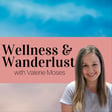
133. Transforming Your Day Through Journaling with Marc and Angel Chernoff
This week, we have a special treat for you as we welcome the incredible duo, Marc and Angel Chernoff, to the show. You’re probably already familiar with Marc and Angel through their blog, Marc and Angel Hack Life, and their many best-selling books. Marc and Angel are renowned authors, speakers, and most recently, the creators of The Good Morning Journal, a powerful tool designed to help you start your day with intention and positivity.
In this episode, we dive deep into the transformative power of morning rituals, discussing how The Good Morning Journal can enhance your mindset, productivity, and overall well-being. Marc and Angel share their insights on cultivating gratitude, setting meaningful intentions, and the importance of consistency in creating new habits.
If you enjoy this episode, please feel free to rate and review the podcast on whatever app you’re listening on, and share with a friend!
OUR SPONSOR
Are you ready to feel more energized, focused, and supported? Go to https://zen.ai/wellnessandwanderlust1 and add nourishing, plant-based foods to fuel you from sunrise to sunset.
CONNECT WITH MARC AND ANGEL
Website: marcandangel.com
Book: The Good Morning Journal
Instagram: @marcandangel
Facebook: facebook.com/marcandangelhacklife
CONNECT WITH THE SHOW
Website: WellnessAndWanderlust.net
Instagram: www.instagram.com/wellnessandwanderlustblog
Facebook: www.facebook.com/wellnessandwanderlustblog
Twitter: www.twitter.com/moses_says

